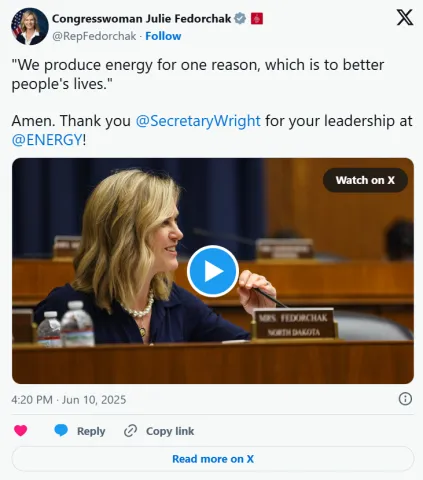Fedorchak and Secretary Wright discuss urgent need for reliable power
Fedorchak highlights new legislation to prohibit early retirement of baseload generation
Washington, D.C. – During a House Energy and Commerce Subcommittee on Energy hearing on the U.S. Department of Energy’s (DOE) Budget for Fiscal Year 2026, Congresswoman Julie Fedorchak (R-ND) asked Secretary Chris Wright how the department monitors retirements of reliable baseload power generators. Secretary Wright thanked Fedorchak for her “thoughtful leadership” and highlighted why grid reliability and permitting reform are essential for reshoring American industry and good-paying jobs.
Fedorchak’s questioning follows her introduction of the Baseload Reliability Protection Act, a bill that would prohibit the retirement of baseload power generators in regions identified as being at elevated or high risk of electricity blackouts.
Key exchange:
Congresswoman Julie Fedorchak: “Given that NERC's assessment today is that two-thirds of our systems in the U.S. don't have enough power to meet demand given certain circumstances today—and we're looking at retiring 115 gigawatts of baseload generation, and we're seeing significant demand increases—all of that looks like a huge train wreck to me and to many others. So today, I introduced a bill called the Baseload Reliability Protection Act, and it will give DOE, FERC, and the grid operators tools to help slow down the retirements, at least in time for new dispatchable resources to be brought on that is kind of equal in nature and how it responds to the grid. I want to invite your support in that. One of the things that we need to be doing is actively tracking where those planned retirements are and how they might impact the grid. I wanted to ask is that something that your office is already doing and working on?”
Secretary Wright: “It is representative, and thank you for, not just your comments and question here, but for your leadership. You've been an outspoken person, and what I used to call or call energy sobriety—just being thoughtful. There's no ‘clean energy sources.’ There's no ‘dirty energy sources.’ They just all have different tradeoffs. We produce energy for one reason, which is to better people's lives. So having a reliable grid that's as affordable as possible and that can grow so we can bring industry and more job opportunities to our states and communities is just critical for doing that, and so yes, it is a thing we're doing right now, because now we’re seeing significant demand growth signals.
“People want to build data centers. I've met with every one of the hyperscalers and a whole bunch of people that want to bring industrial factories and plants back to the United States. I think it's awesome. It's awesome for our country—it's awesome for blue collar workers. It's something I really want to see happen, but that is their biggest worry: ‘Hey, if we come here, how am I going to navigate through FERC to be able to build a power plant? How am I going to know I have reliable, affordable power? It's going to take me $10 billion to build my plant. It's going to run for 40 years. I want to know how I can get confidence in the energy thoughtfulness of the United States and that price.’
“And so, when people want tens of gigawatts of more power, and we're shutting down facilities with decades left on their lifetime, that doesn't look so thoughtful. So yes, we have a team in our Office of Electricity, that's looking at grid reserve margins across the different areas of the country, and we're looking at planned retirements, and then we're going to try to proactively engage with all of them. Why is this asset retiring? Does it make sense? Is there a better plan here, and if it is retiring, what's going to replace it that's equally dispatchable and firm, reliable, and won't add to the cost of the grid or increase the either increase the cost or reduce the reliability of the grid?”
Congresswoman Julie Fedorchak: “Good. My bill would make what you're doing into law and basically require it so that before anybody could retire a unit in one of the regions that have an elevated reliability risk, they would have to prove that it's being replaced in advance by equally reliable power. And then, if it isn't, then it would give you and FERC tools to require that they run and some financial support to help cover those costs, so it doesn't fall on the ratepayers. And this might be a five-year thing. This might not be forever, but right now, we're behind. So, let's stop retiring and let's make sure we're bringing new resources on as quickly as possible. I stand with my colleagues across the aisle to work on permitting reform, to bring things up as quickly as possible, but meanwhile, we need to keep what we have. That should not be a partisan statement. Thank you for your leadership there.”
###
